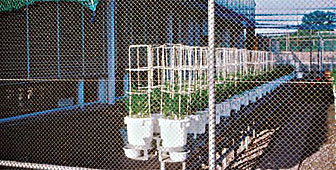
Divide over gene technology runs deep

Supporters and opponents of genetic engineering have been exchanging words ahead of a key parliamentary debate on whether to legalise genetically modified plants.
Environmental groups, Pro Natura and the Swiss branch of the World Wide Fund for Nature, handed over 30,000 signatures to the Senate, calling for a moratorium on the commercial use of GM plants.
Carol Franklin, director of WWF Switzerland said a moratorium would give scientists time to answer some of the fears raised by genetically modified organisms (GMOs) – will they mutate, will they jump species and what effect could they have on humans?
“Surveys show that people don’t want GMOs either in food or in agriculture,” she said. “We think it is time that parliament listens to the people. We are very hopeful that we will arrive at a moratorium because we just don’t know the dangers and we haven’t the faintest idea what could happen.”
That view was strongly opposed by scientists, who organised a forum in Bern to discuss the merits of genetic research.
Jean-Pierre Zryd, professor of plant biology at the university of Lausanne, is involved in a European project to improve the genetic transformation of plants. The research focuses on targeting a specific gene inside the plant to modify its properties.
Zryd said the fears raised by opponents of GMOs about mutation or the risk that they would cross over into other species were not specific to genetic engineering.
“When you modify one gene, why should it be worse than when you do hybrids or you induce mutation in classical breeding and in what we call normal agriculture,” he said.
Beat Keller from the institute of plant biology at the University of Zurich said GM plants not only meant increased productivity but healthier crops which require less chemical fertilisers and pesticides.
He said it would be virtually impossible to assess the risks with a moratorium as testing in the laboratory is very different from testing in the field.
“A moratorium for commercial release would certainly have a negative impact on possibility of doing experimental field trials with transgenic plants,” he said. “That means we would not get any additional knowledge on the risks and on the potential environmental impact of transgenic plants in the years ahead.”
The Senate is discussing strict scientific and environmental conditions for the cultivation of genetically modified crops.
Daniel Schümperli, professor of cell biology at the university of Bern and president of the forum for genetic research of the Swiss academy of sciences, said the measures parliament are discussing would hopefully provide sufficient control.
“We have analysed the situation in Switzerland,” he said. “We think current legislation coupled with the new project, Genlex, will give us stiff but fair legislation and that in this case there is no scientific reason to have in addition a moratorium on releases.”
by Vincent Landon

In compliance with the JTI standards
More: SWI swissinfo.ch certified by the Journalism Trust Initiative
















![The four-metre-long painting "Sonntag der Bergbauern" [Sunday of the Mountain Farmers, 1923-24/26] had to be removed by a crane from the German Chancellery in Berlin for the exhibition in Bern.](https://www.swissinfo.ch/content/wp-content/uploads/sites/13/2025/12/01_Pressebild_KirchnerxKirchner.jpg?ver=917ecbf2)














You can find an overview of ongoing debates with our journalists here . Please join us!
If you want to start a conversation about a topic raised in this article or want to report factual errors, email us at english@swissinfo.ch.